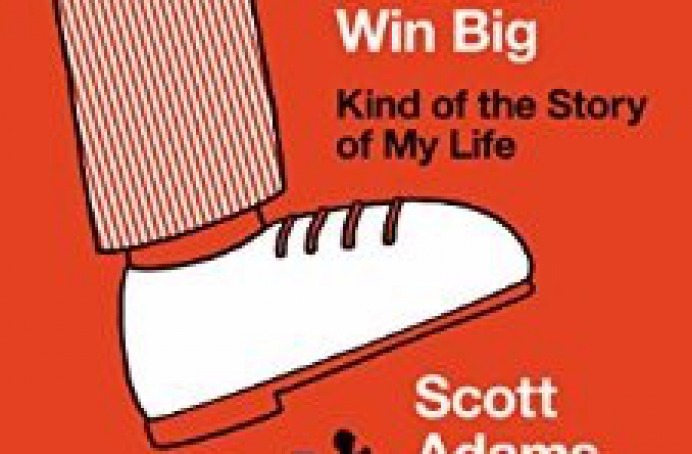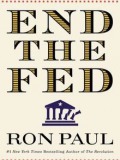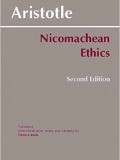Book

How to Fail at Almost Everything and Still Win Big: Kind of the Story of My Life
Blasting clichéd career advice, the contrarian pundit and creator of Dilbert recounts the humorous ups and downs of his career, revealing the outsized role of luck in our lives and how best to play the system.
Scott Adams has likely failed at more things than anyone you’ve ever met or anyone you’ve even heard of. So how did he go from hapless office worker and serial failure to the creator of Dilbert, one of the world’s most famous syndicated comic strips, in just a few years? In How to Fail at Almost Everything and Still Win Big, Adams shares the game plan he’s followed since he was a teen: invite failure in, embrace it, then pick its pocket.
No career guide can offer advice that works for everyone. As Adams explains, your best bet is to study the ways of others who made it big and try to glean some tricks and strategies that make sense for you. Adams pulls back the covers on his own unusual life and shares how he turned one failure after another—including his corporate career, his inventions, his investments, and his two restaurants—into something good and lasting. There’s a lot to learn from his personal story, and a lot of entertainment along the way. Adams discovered some unlikely truths that helped to propel him forward. For instance:
• Goals are for losers. Systems are for winners.
• “Passion” is bull. What you need is personal energy.
• A combination of mediocre skills can make you surprisingly valuable.
• You can manage your odds in a way that makes you look lucky to others.
Adams hopes you can laugh at his failures while discovering some unique and helpful ideas on your own path to personal victory. As he writes: “This is a story of one person’s unlikely success within the context of scores of embarrassing failures. Was my eventual success primarily a result of talent, luck, hard work, or an accidental just-right balance of each? All I know for sure is that I pursued a conscious strategy of managing my opportunities in a way that would make it easier for luck to find me.”
Scott Adams has likely failed at more things than anyone you’ve ever met or anyone you’ve even heard of. So how did he go from hapless office worker and serial failure to the creator of Dilbert, one of the world’s most famous syndicated comic strips, in just a few years? In How to Fail at Almost Everything and Still Win Big, Adams shares the game plan he’s followed since he was a teen: invite failure in, embrace it, then pick its pocket.
No career guide can offer advice that works for everyone. As Adams explains, your best bet is to study the ways of others who made it big and try to glean some tricks and strategies that make sense for you. Adams pulls back the covers on his own unusual life and shares how he turned one failure after another—including his corporate career, his inventions, his investments, and his two restaurants—into something good and lasting. There’s a lot to learn from his personal story, and a lot of entertainment along the way. Adams discovered some unlikely truths that helped to propel him forward. For instance:
• Goals are for losers. Systems are for winners.
• “Passion” is bull. What you need is personal energy.
• A combination of mediocre skills can make you surprisingly valuable.
• You can manage your odds in a way that makes you look lucky to others.
Adams hopes you can laugh at his failures while discovering some unique and helpful ideas on your own path to personal victory. As he writes: “This is a story of one person’s unlikely success within the context of scores of embarrassing failures. Was my eventual success primarily a result of talent, luck, hard work, or an accidental just-right balance of each? All I know for sure is that I pursued a conscious strategy of managing my opportunities in a way that would make it easier for luck to find me.”
aboutLiberty Portal
Liberty Portal is your gateway for free markets and free thinking. We aggregate open-sourced content to promote and popularize important people and lessons within the liberty movement.
suggested
Ron Paul
End The Fed

In the post-meltdown world, it is irresponsible, ineffective, and ultimately useless to have a serious economic debate without considering and challenging the role of the Federal Reserve.
Most people think of the Fed as an indispensable institution without which the country's economy could not properly function. But in END THE FED, Ron Paul draws on American history, economics, and fascinating stories from his own long political life to argue that the Fed is both corrupt and unconstitutional. It is inflating currency today at nearly a Weimar or Zimbabwe level, a practice that threatens to put us into an inflationary depression where $100 bills are worthless. What most people don't realize is that the Fed -- created by the Morgans and Rockefellers at a private club off the coast of Georgia -- is actually working against their own personal interests. Congressman Paul's urgent appeal to all citizens and officials tells us where we went wrong and what we need to do fix America's economic policy for future generations.
Read moreMost people think of the Fed as an indispensable institution without which the country's economy could not properly function. But in END THE FED, Ron Paul draws on American history, economics, and fascinating stories from his own long political life to argue that the Fed is both corrupt and unconstitutional. It is inflating currency today at nearly a Weimar or Zimbabwe level, a practice that threatens to put us into an inflationary depression where $100 bills are worthless. What most people don't realize is that the Fed -- created by the Morgans and Rockefellers at a private club off the coast of Georgia -- is actually working against their own personal interests. Congressman Paul's urgent appeal to all citizens and officials tells us where we went wrong and what we need to do fix America's economic policy for future generations.
Naked Nutrition
Pure Creatine Monohydrate

- ONLY ONE INGREDIENT: 100% Pure Micronized Creatine Monohydrate. Certified Vegan, Non-GMO, Soy Free and Gluten Free.
- HIGHEST QUALITY: Naked Creatine is the highest grade creatine monohydrate supplement available.
- FAST DISSOLVING: Unlike other brands, Naked Creatine dissolves quickly in water or your juice of choice.
- RAPID ABSORPTION: Pure creatine monohydrate allows for fast absorption which enhances gains, strength, and increases training capacity.
- NO ADDITIVES: Made from pure monohydrate creatine with no artificial sweeteners, flavors or colors.
Aristotle
Nicomachean Ethics

Building on the strengths of the first edition, the second edition of the Irwin Nicomachean Ethics features a revised translation (with little editorial intervention), expanded notes (including a summary of the argument of each chapter), an expanded Introduction, and a revised glossary.
Read more


